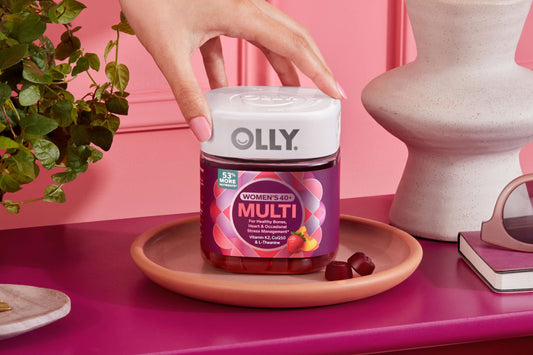Here at OLLY, we take gut health seriously. And with good reason: a healthy gut is essential for overall health and well-being. We believe caring for your digestion and gut proactively—as opposed to reactive over the counter solutions—is a crucial part of everyday wellness.
The Goods Inside
- Gut health myths abound—we get to the bottom of 4 common ones.
- Most of our immune system lives in our digestive tract, so keeping our bellies happy is a big deal.
Gut health is also a complex issue brimming with misunderstandings.
So if you’ve gotten a mixed message or two about things you should or shouldn’t do to support your digestive health, you’re not alone. The good news: we’re here to help by breaking down four common myths.
Myth #1: Daily Bowel Movements are a Must
69% of Americans believe you need to poop daily.1 The real deal: healthy poops have a lot to do with consistency—not too hard, not too soft—and not just frequency.
The Bristol Stool Chart is often used to measure stool quality from 1-7
- Type 1-2 is considered constipation, as the poops are difficult to pass
- Type 3-4 is considered healthy, as they are easy to pass
- Type 5-7 is considered fast motility, resulting in watery stools

If your poop is “just right”, it’s a sign your gut is in balance. This means you have a healthy mix of bacteria and probiotics that support optimal transit time and reduced inflammation.2
Looking to get your stools on track? Try these bowel-balancing tips:
- Eat fiber-rich foods (aka fruits and veggies) to help move things along3
- Drink plenty of water to keep poops soft and easy to pass3
- Try a supplement with probiotics to support your gut microbiome, like OLLY Tropical Mango Probiotic gummies*
The bottom line:
Gut health is often shown in poop consistency, not just frequency.
Myth #2: Juice Cleanses are Good for Your Gut
Half of the American population are drawn to juice cleanses, either having tried, currently trying or wanting to try one.1 This type of diet, which involves consuming only juices from vegetables and fruits, is often framed as a quick fix. Easy to follow that logic, right? How could lots of fruits and veggie juice not be good for you? The reality: gut health is complex and there isn’t a simple shortcut.
Your body already has a natural detox system, like your liver, kidneys and GI tract.4 Juice cleanses can lead to nutrient imbalances, and they tend to lack fiber which is key for a healthy gut.4 Another factor: it’s important to have a balance of good bacteria in the gut, which can get neglected without a balanced diet.
The bottom line:
Skip the cleanse and opt for a balanced diet that includes fruits and veggies.
Myth #3: Gut Health Issues Stay in Your Gut
Only about half of Americans are aware that poor sleep can be a sign of an unhealthy gut.1 The importance of the gut/brain connection is something scientists are continuing to learn about, but we know that the two have a special relationship. And when the connection is out of whack, it can affect various aspects of our health.

Ways this shows up:
- The Vagus nerve connects the gut and brain, helping to manage stress—any gut issues can disrupt this5
- The gut produces chemicals sent to your brain that affect mood and emotions, like serotonin and GABA5
- The gut (which houses 70-80% of your immune system) protects mental health by preventing toxins from entering the bloodstream5
The bottom line:
Taking care of your gut goes way beyond the belly.
Myth #4: Supplements are a Quick Fix for a Healthy Gut
Gut health supplements aren’t a magical shortcut, but they’re like your BFF ready to support you along your health journey. The best approach: focus on building healthy daily habits for long-term results. For example, think of Probiotics like the new multivitamin—the thing everyone does every day without thinking too hard about it.
More ways to support your gut health on the daily:
- Manage stress with yoga, meditation and reflection6
- Eat smaller, more frequent meals to avoid overwhelming your gut6
- Try OLLY Probiotic + Prebiotic gut health gummies
The bottom line:
It’s all about bite-sized daily habits.
When it comes to health advice, there’s a lot of information out there. Don’t believe everything you see on social media. It’s always a good idea to do your research and seek out peer-reviewed or scientifically backed articles. Here’s to delightful digestion!
References:
1Kellman, R. (2014). The microbiome diet: The scientifically proven way to restore your gut health and achieve permanent weight loss. Da capo Lifelong Books.
2 Tuohy, Kieran M., et al. "Using probiotics and prebiotics to improve gut health." Drug discovery today 8.15 (2003): 692-700.
3 MDVIP/Ipsos. (2023). Findings of study: Results of a MDVIP/Ipsos poll conducted between Marsh 28-29, 2023. [Data file]. Retrieved from https://www.ipsos.com/sites/default/files/ct/news/documents/2023-05/MDVIP%20-%20Gut%20Health%20Key%20Findings%20May%202023_0.pdf - new window
4 Smith, J. (2020). The importance of gut health. Journal of Nutrition and Wellness, 10(2), 1-10.
5 Gundersen Health System. (n.d.). Gut health 101: Is your poop normal? Retrieved from https://www.gundersenhealth.org/health-wellness/staying-healthy/gut-health-101-is-your-poop-normal - new window
6 Live Science. (2015, June 17). Juice cleanses: Fact or fiction? https://www.livescience.com/48941-juice-cleanses-fact-fiction.html - new window
7 Healthline. (n.d.). Signs of an Unhealthy Gut and What to Do About it. Retrieved from https://www.healthline.com/health/gut-health - new window
8 Healthline. (n.d.). The gut-brain connection: How gut health affects mental health. Retrieved from https://www.healthline.com/nutrition/gut-brain-connection - new window
9 MDVIP. (2023). Most Americans are uninformed about gut health and the microbiome. Ipsos. https://www.ipsos.com/en-us/most-americans-are-uninformed-about-gut-health-and-microbiome - new window
10 Piedmont Healthcare. (n.d.). 10 tips for a healthier gut. Retrieved from https://www.piedmont.org/living-real-change/10-tips-for-a-healthier-gut - new window


